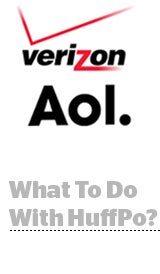 As the media and tech worlds absorb news of Verizon’s planned acquisition of AOL, the largest unanswered question revolves around the fate of The Huffington Post Media Group, a unit that includes the eponymous publication as well as TechCrunch, Engadget and others. While Re/code’s Kara Swisher reported “advanced discussions” for AOL to sell its flagship media brands to German media conglomerate Axel Springer, not everyone is certain if a sale of AOL’s owned sites is a good idea.
As the media and tech worlds absorb news of Verizon’s planned acquisition of AOL, the largest unanswered question revolves around the fate of The Huffington Post Media Group, a unit that includes the eponymous publication as well as TechCrunch, Engadget and others. While Re/code’s Kara Swisher reported “advanced discussions” for AOL to sell its flagship media brands to German media conglomerate Axel Springer, not everyone is certain if a sale of AOL’s owned sites is a good idea.
Ray Wang, founder and principal analyst at Constellation Research, believes that it’s important to keep the ad tech and content production segments intact.
“The HuffPo piece is really important given its reach. The arms dealer is the technology, but the deal is about content.” Wang sees an emerging set of global behemoths that are elevated by three key pillars – their ad tech, network and content – and that will outcompete those who only provide the technology and infrastructure. “If you’re going to be in the digital world, or if you’re going to dominate it rather, you have to own all three. ”
In that light, Verizon’s move can be seen as a push back against companies like Apple and Google, who have encroached on traditional telecom turf in recent months by moving into broadband and broadcast networks.
On the other hand, many investors and analysts see a Huffington Post sale as intuitive, if not inevitable. Brian Weiser, an analyst at Pivotal Research Group, said a sale makes perfect sense. Unlike Wang, Weiser thinks AOL’s publishing brands are not necessarily strategic assets.
“It’s already a bit of a stretch for a telco to manage a standalone advertising biz,” he said. “When you add in a content biz, which is fundamentally a bit different, it’s going to get starved of resources that could be better managed by a [standalone] entity.”
Other digital media veterans echo those sentiments. Rebecca Lieb, an analyst at the Altimeter Group, said, “I really believe that any benefits to AOL’s content properties are secondary to the deal. It wouldn’t surprise me to see them sold off once the dust settles.”
And while it’s not a surprise for Verizon to eye content distribution channels, said Digital Capital Advisors managing director Elgin Thompson (“they’re kicking themselves for not getting CBS three years ago”), that isn’t Verizon’s focus with its intent to acquire AOL. “You can make the argument [for Verizon keeping HuffPo] … but I would expect them to sell it,” he said.
The Huffington Post has faced rumors of a spin-off ever since its original sale. One year after AOL acquired the content producer, Jimmy Maymann, then a SVP of international business and now the Huffington Post’s CEO, told Robert Andrews of the now-defunct GigaOM, “AOL is the owner. But I cannot stand here and say, some day, ‘AOL will not sell it if the price is high enough or there is a better owner’.” Andrews also alluded to investors who had expressed interest in a deal.
Axel Springer, the German publishing powerhouse Re/code suspects is leading the charge for HuffPo, has been a common name when it comes to American media properties that are up for sale. An Axel Springer spokesperson said the company won’t comment on market speculation, although it has made a series of notable moves.
“In the U.S., Axel Springer is the second largest investor in Ozy … and holds minority interests in the online business magazine Business Insider, the start-up Readitlater (developer of the market-leading save-for-later app Pocket). … Axel Springer also acquired 100% of the digital publisher Livingly Media,” said a spokesperson. That list can also include POLITICO’s expansion into Europe, which is being launched in partnership with Axel Springer.
In a Capital New York feature published last month, Axel Springer publisher Mathias Döpfner spoke with Ken Doctor about the priorities driving his company’s acquisitions. “For Springer, big—and further, creating an image of bigness—is fundamental to its strategy. Reach is one way to measure that bigness. … Springer touches many more unique visitors in Europe than do its peers.”
And The Huffington Post reaches more unique users than any other digital-first publication. According to the recent Pew Research State of the News Media report, HuffPo reaches 100 million unique users per month across mobile and desktop, compared to Buzzfeed (the only other digital-only publication in the top 10), which has a monthly user base of 78 million.
The Huffington Post already partners with Burda, a German publishing house that is a smaller competitor to Axel Springer, for its German edition. Investment bankers have noted to AdExchanger that Burda has the digital assets to potentially absorb HuffPo, if it wanted to take the inside track against Axel Springer.











